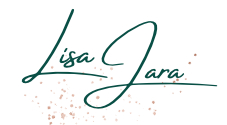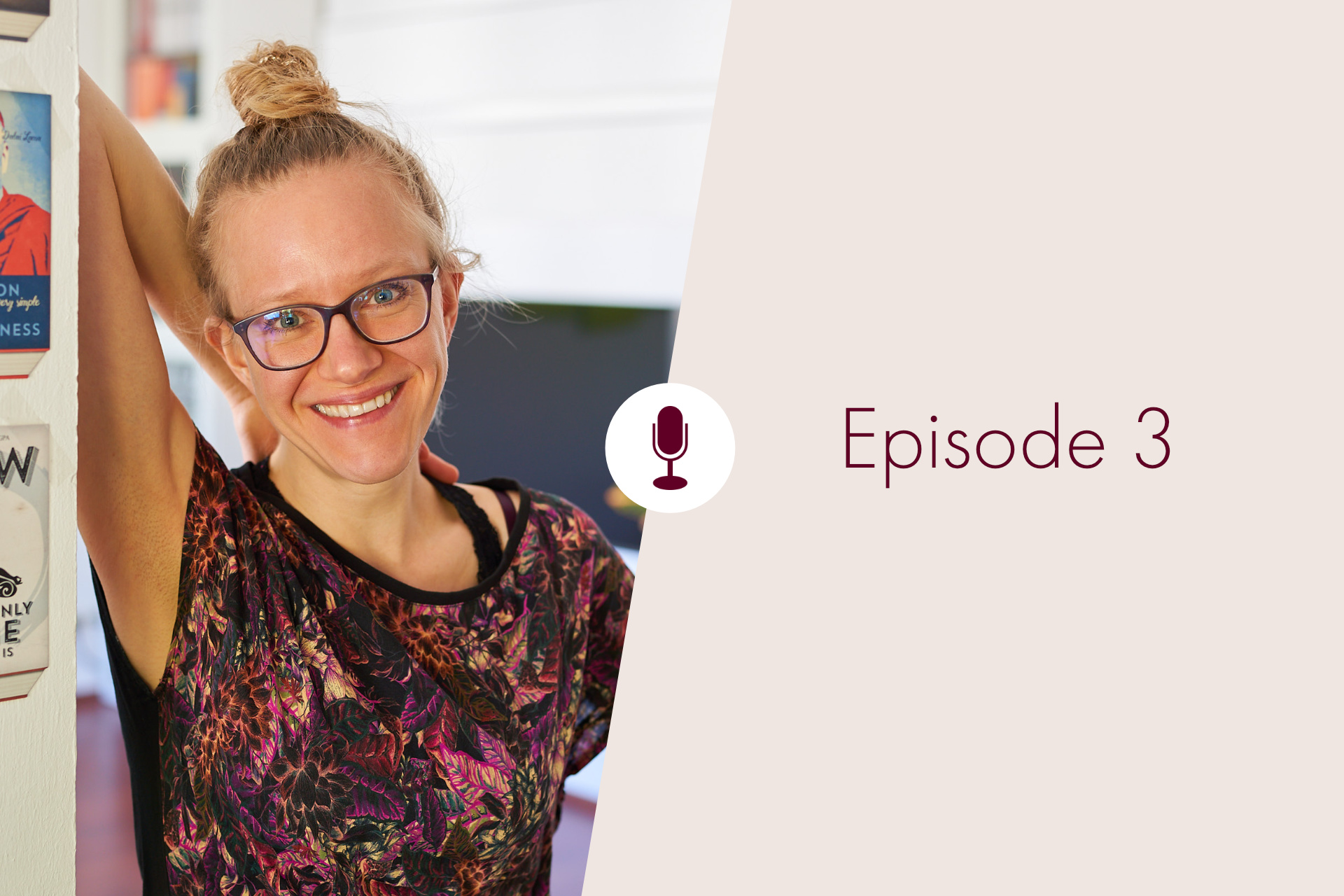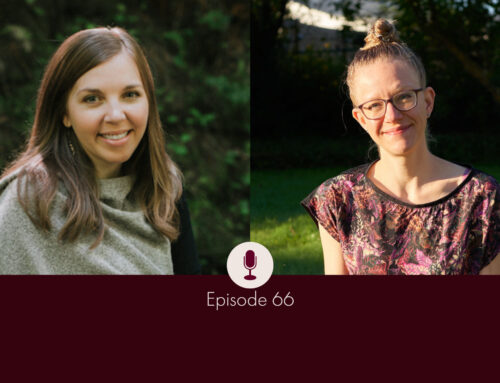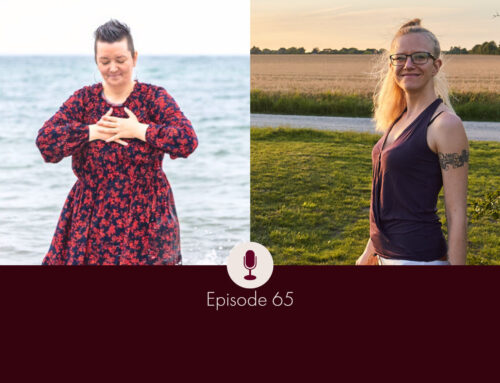[00:00:45] Hi everyone. Today I am a little afraid to say what I want to say because I know that what I’m about to say will be polarising. And I’m on my day 21, which is my inner autumn, and I can feel my truth wanting to bubble up. And my truth isn’t always the nice kind of girl voice or opinion, and that’s why today what I want to say is my truth, but it’s potentially going to make you mad at me. And I don’t want people to be mad at me, but I prefer to stay true to myself and say what’s on my mind.
[00:01:36] Which is on the topic of empowerment, because I see so many people out there claiming “I empower women to X, Y, Z”, “I empower people to”, “I empower. I empower.” and I’m sick of it. Please stop saying that you empower anyone because you don’t. You can’t. We can’t empower another person, I, myself included. I can’t empower anyone. Yes, I sometimes get feedback where people say “What you say is so empowering.” Might very well be. But I do not come from this place of “I empower someone”, because the power is already in you and I can’t give it to you.
[00:02:26] I understand that this way of saying it comes from a genuine wish to help for most of the people. I truly, truly believe that even if you use it, that it comes from this deep wish to do good in the world. And I myself, I have said that in the past and thought that I do empower people or I “empower women to reclaim whatever”. But when I worked for a feminist women’s rights organisation, I understood what empowerment truly means. Because there was a colleague who explained it in a very visual way that stuck with me and that that I found really enlightening.
[00:03:22] Imagine you’ve got a wall, a brick wall, and there is something really cool to look at on the other side. And you’ve got a person who wants to look at this really cool thing on the other side. There is a chair, and that person’s small, but with a chair, they could look over the wall. And yes, I could go and take that chair, put it before the person so they can step on it and look over the wall. But what true empowerment means is, that person understands that they are worthy enough, powerful enough, strong enough to take that chair themselves, set it down in front of the wall, step on it, and look over it. So it has only to do with that person who empowers themselves. And for me, that has been the turning point of when I started to reflect on empowerment and how I use that word in my marketing or when I speak with friends, and I actually don’t use that word anymore, although I do believe that my work is still in the spirit of women’s empowerment.
[00:04:56] What I have come to think about empowerment is that it comes from a very colonialist mindset. From a patriarchal mindset. Because very often, even in Development Cooperation on a world level, the organisations that want to help, they may have a very noble cause, but it still comes from this hierarchical thinking of “Oh, you poor thing, you need my help, so I go and empower you.” And I have heard people in these organisations that claim empowerment, say “Why do you waste your time teaching African women how to use a computer, they won’t understand?” And please, that has to stop! This hierarchical thinking of somebody being better or less than another person, that’s plain wrong! Humans are humans and we are all the same. We intrinsically have this power and wisdom inside of us, and I get sick when I hear people saying things like that.
[00:06:24] Again, it feels so noble to say “Oh, I empower other people, so they are powerful too, so they become powerful too.” But reflect on this: Do you already believe they are powerful? Because if you do, there is no need to empower them because they are already powerful. The thing we can do is to teach them or show them tools or practices or strategies they can use to feel more powerful themselves. But again, this feeling of being powerful comes from within them. So I really encourage you to inquire for yourself where this motivation to say “I empower people” comes from. Does it come from you really believing they are already powerful beings? Or does it maybe also have to do with you feeling good about doing “good things”, because empowerment is generally thought of as a good thing?
[00:07:37] Also, we might try to give them tools and strategies, or they come to us to ask for tools and strategies, but maybe what we teach doesn’t work for that person or it doesn’t work in their context or in that situation of life they are in. And so we always have to be humble enough to step back and say, “Okay, with what I have shared with you, what resonates, what feels like something you could implement in your own life, because it will make you feel like the powerful being that you already are? “
[00:08:23] And it might sound that I’m very pedantic or petty, making this distinction between “empowering someone” or “working in the field of empowerment”, where you offer something that you have, some kind of wisdom. And what just comes into my mind is that I believe it’s not even so much about us giving a tool or a strategy or a mindset shift. It’s more about us saying something that sparks a remembrance in the other, because they already have that wisdom in them. So it’s not like our thing brings the big enlightenment in them, but it’s rather that what I say, for example, sparks a remembrance in you and you go “Oh yes, I know that. I knew that all along. It’s inside me.” And levels the playing field. It’s not a hierarchical order, it’s not somebody higher than the other, somebody having more wisdom, more experience, being an expert, but it’s treating the other as being the expert on themselves already and just sparking some ideas or remembrances.
[00:10:01] And yeah, I may seem very pedantic and petty for making this very clear distinction that we can kind of work in an environment of empowerment, but we don’t empower the other. But I want to remind you that our words create our world. Words create our reality. The words we use with the meanings they have for us, because the same word can have a slightly different meaning for another person, my freedom doesn’t look like the freedom you envision when you think of freedom. And so, our words, the words we use, create the reality we live in.
[00:10:48] Spelling comes from spell. I love that phrase, which unfortunately doesn’t work in my native language, in German. But with our words, we create spells and we can be mindful about what we say and how that translates, or how that is informed by our belief system.
[00:11:17] So I really want to encourage you to think about your motivation behind saying you empower someone. I actually ask anybody who uses that word, what’s their motivation behind empowering someone? Because in my opinion, you can’t. And again, this is not to shame anybody. I myself have used those words in that sense and I went into myself and I inquired where that actually comes from, and I found that I prefer that visual of the person taking the chair themselves and finding themselves powerful enough to look over that wall. That’s the kind of empowerment I speak of WHEN I really speak of empowerment.
[00:12:17] And I believe that it all starts already with the definition of the word empowerment, which is very misleading in my opinion. Because I looked it up, I am a word geek, I love etymology and all of that, and the definition of empowerment is to give someone more control over their life or more power to do something. And you know what? You can’t control life. We humans can’t control anything, we don’t even know if we will still exist tomorrow or if something has happened to us by then. And as much as our brains love stability and control, it’s an illusion.
[00:13:13] So saying that that we could give somebody more control is also an illusion. They can develop a sense of control in themselves when they realise “Oh, I am a powerful being. I have abilities and strengths to navigate a situation in life.” That’s where the control comes from, when we believe we are powerful enough to deal with whatever is present.
[00:13:41] So it’s not like it’s not possible to give somebody power, it’s always just this recognition in them that the power was there all along. For me, the antidote is to be aware of the power of choice that we have every day. Because we do. Even when we feel helpless or powerless in a situation, there are things we can control and if it’s just the way we think about the situation. And actually, that’s not even “just”, because the way we think about things is a very powerful tool. So we always have some kind of choice and it’s about looking for it; within all these things that might already be fixed and that you can’t change, look for what is possible for you within that?
[00:14:51] Also, we need to recognise these structures that are at hand, the systems we live in which promote powerlessness, which promote keeping us in a disempowered state, constantly keeping us occupied with little details about our lives that don’t matter in the big circumstance. But that way we don’t start questioning the systems we live in.
[00:15:23] And again, this is not to shame anybody. I am falling prey to that all the time. I also get obsessed with my weight or what my body looks like or the food that I eat. I start scrolling mindlessly because I just want to forget how disempowered I feel. And that’s the very thing: If we recognise that this is just manufactured to keep us in this state of disempowerment, then we have some leeway, then we can start looking for “Okay, where DO I actually have more power than I thought? ”
[00:16:08] And there’s also a learned helplessness. There was this beautiful example I read in a book, with a little elephant chained up to a rod, and the rod is so sturdy that the little elephant can’t do anything, can’t move away from it. And the elephant grows, but it still remembers “Oh, I can’t do anything against the chains and the rod.” So now the rod and the chains aren’t even necessary. They wouldn’t be able to hold that elephant, anyway, but the elephant has remembered, “Oh, when the rod is there and my chains are on, I am helpless. I can’t do anything.” even though it is so much stronger when it’s grown.
[00:17:00] And we are sometimes similar, the systems are set up that way. “Yeah, don’t worry, don’t worry. We’ve got you.” I listened to a podcast recently on the birth experience and how so many women have a traumatic birth experience because they feel helpless in the situation. Because all the nurses and the doctors say “Yeah, don’t worry. We will give you something to sedate you, we’ll give you something, we will take care of you. We will do a C-section, so you don’t have to worry. You can just be happy with your child.”
[00:17:41] And this is not how people birth. This is not how women birth. It’s a messy process with a lot of grunting and shouting and crying like an animal does. We are animals after all, and so we’ve learned to give in to that helplessness and that somebody else will take care of us. And that can sometimes lead to feeling disempowered and waiting for somebody to finally come and empower us. So we stay in this state where we don’t feel powerful and then somebody else comes along, the knight in shiny armour, who rescues us from this disempowered state. And then we’ve got this hierarchical patriarchal structure again, that I talked about earlier, just now from the other perspective. I just want to say, this world of empowerment is a very fine line to navigate and I really encourage you to question your motivation behind wanting to empower someone.
[00:19:05] Again, I do believe that most people do that from a genuine wish to make this world a better place, because hey, empowerment, that feels so good and like exactly what we need in our society. And yet, it often still shows this kind of hierarchical thinking I myself have fallen prey to before, that there is someone who has the power to give somebody else power. And I don’t subscribe to that. I believe we are all enormously powerful beings with more power than we think possible.
[00:20:04] We are afraid of it. We are afraid of feeling so powerful because we’ve learned from what we see all around that people in power in the society often use it to abuse. And so of course we don’t want to be like them and we restrict ourselves exercising our own power, but this is the power that comes from within. When you are in your seat of power, you have a magnetic radiance to you that is attracting people. That is helping them feel passionate about what they are passionate about.
[00:20:53] It’s inspiring when somebody is in their power, but in this centre place of power, not in a “power over”, but “my power comes from within and this is who I am, and who I am is beautiful, and that’s it.” Kind of power.
[00:21:12] Yeah, I hope this little rant has still been of value to you. Let me know your thoughts. I would be very curious to know where you agree or disagree or what your thoughts on it are. Even though I definitely feel a little uncomfortable asking for that feedback, but I still want to know because I know I’m powerful enough to deal with whatever your reaction.
This is it for today, and speak to you next time.





